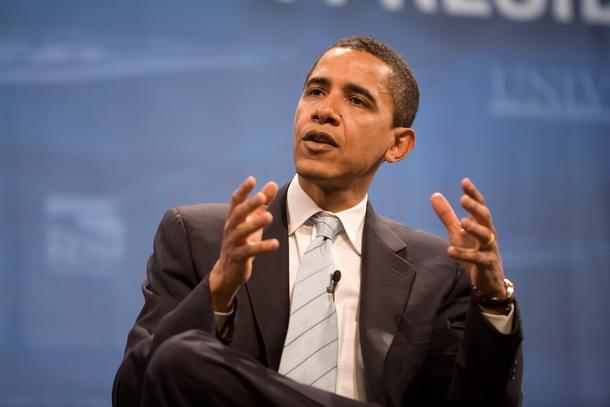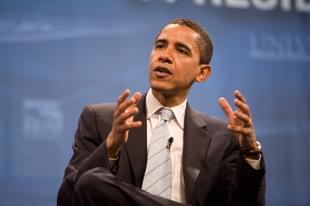World
Is Gandhi the Best Indian Secularist Obama Could Find?
Nishad Sanzagiri
Feb 11, 2015, 06:10 PM | Updated Feb 18, 2016, 12:33 PM IST
Save & read from anywhere!
Bookmark stories for easy access on any device or the Swarajya app.


Gandhi’s views on proselytism and secularism are diametrically opposite to what Obama would like India to adopt.
Shockwaves rippled across India when President Obama commented that Mahatma Gandhi would have been shocked by the acts of religious intolerance in India — a country famed for its diversity — just days after returning from an extravagant (and hopefully fruitful) trip to the world’s largest democracy.
“In past years,” President Obama stated, “religious faiths of all types have, on occasion, been targeted by other peoples of faith, simply due to their heritage and their beliefs — acts of intolerance that would have shocked Gandhiji, the person who helped to liberate that nation.”
Obama’s statement, referred to by The Times of India as “an embarrassing smack-down”, is the latest addition to the secularism debate; one that’s been a permanent fixture in the Indian political scene ever since Modi came to power last year.
However, the point is: Why did Obama use the example of Gandhi while talking about secularism? Why not Ambedkar (the father of India’s Constitution) or Abul Kalam Azad (widely known for Hindu-Muslim unity in the freedom movement, and India’s first Minister of Education)? Or even Nehru? Maybe the last one would be too politically contentious — given that Nehru’s descendents now reign over the Indian National Congress — political opponents of the ruling Bharatiya Janata Party.
Gandhi has long been held as the spiritual father of Indian Secularism. But how true is this claim? Secularism, as a principle, is defined as a demarcation between the political realm and the spiritual and religious domain. And if we go by this definition, then Gandhi was in no way a “true secularist.”
The reason I say this is twofold: Firstly, Gandhi did not necessarily understand secularism as delineation between the political and sacred/religious domains. Gandhi’s vision of secularism — as stated by T. N. Madan, “was holistic, with religion as its constitutive principle — as the source of value for judging the worth of all worldly goals and actions.” He emphasized the notion of value, particularly altruism and self-assurance stemming from inner conviction, towards judging one’s actions. The Gandhian vision of politics was, to put it clearly, completely enmeshed with religion.
To highlight this point, here’s something Gandhi wrote in 1940:
“I cannot conceive politics as divorced from religion. Indeed religion should pervade every one of our actions. Here, religion does not mean sectarianism. It means a belief in ordered moral government of the universe.”
In addition, Gandhi’s role in religion was largely limited to consolidating the divisions in Hinduism itself — he never took objection with calling himself a “Sanatani” Hindu, and devoted most of his life to reforming the Hindu society. For example, he was against Ambedkar in the latter’s stance of separate electorates for lower caste Hindus; believing instead, that all Hindus were equals as a single religious group.
Secondly — as R. Jagannathan pointed out in 2008 — there are some striking similarities between Gandhi’s statements then and those made by the Hindu nationalist RSS (the ideological front of the BJP; blamed by many for the rise in intolerant religious sentiments in India) in recent years.
To take a recent example: The BJP and its ideological bases have been criticised by the opposition and ‘(pseudo-)secular’ commentators for wanting to pass an anti-conversion bill that would ban “forceful” religious conversions. However, as Jagannathan points out, Gandhi would have approved such a ban on conversions. He was of the view that conversions had the ability to alter one’s allegiance to the nation, and he felt the notion of converting anybody as abhorrent.
As Gandhi stated in 1935:
“I believe that there is no such thing as conversion from one faith to another in the accepted sense of the word.”
Also, in reference to Christian missionaries converting Hindus, he wrote in his weekly newspaper Harijan in 1937:
“Christian friends … harbour in their breast that Hinduism is an error and that Christianity, as they believe it, is the only true religion … so far as one can understand the present (Christian) effort, it is to uproot Hinduism from her very foundation and replace it by another faith.”
Now, I do agree that Gandhi lived in an era when political correctness wasn’t such a big thing, and I’m willing to give him the benefit of the doubt. However, maybe — just maybe — the way in which India’s pre-eminent freedom fighter defined secularism and the political leeway he granted for religion in the affairs of the state would have ‘shocked’ us (and Obama) just as much as religious intolerance would have shocked him.
A second-year student pursuing an MA (Hons) in International Relations with Quantitative Methods at the University of Edinburgh.





